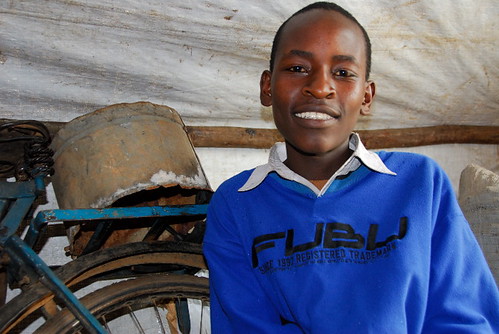After speaking to the men and women of Lelmolok, we were eager to hear from the mentees – those youth who were the whole reason for our visit and for the mentoring program itself. We were enthusiastic; the kids were what we should have expected: tired, cold in their torn jackets and indifferent to the interest of more white people coming to collect information and give, well, nothing.
We asked them about their experiences with the mentoring program, and their focus was material: they remembered the clothing that the mentors brought for them once, and the books they could sometimes afford to offer to the mentees. The emotional support was secondary to these young people. And why was that so surprising? When you have lost everything that was a comfort, and there is already a cultural tendency to keep emotions in rather than letting them out, the gift of a new dress or a pair of pants without holes is paramount.
I’ve included short summaries here of my interviews with mentees. While it was difficult to assess the significance of the mentoring in their lives, it was clear that they felt recognized by someone outside of the camp – and this may be more than enough reason for continuing the program.
 Photo: Kate Cummings. Location: Lelmolok IDP camp, Kenya. Partner: Vital Voices
Photo: Kate Cummings. Location: Lelmolok IDP camp, Kenya. Partner: Vital Voices
Lucy Njoki – 14 years old, 7th grade:
I like the mentoring program because they bring us clothes. I wish I had a school uniform because other children tease me. They make me take off my sweater when I arrive in the mornings to show I have no uniform. When I’m with my mentor, we play games and talk about how life is going. My mentor told me to try and forgive and forget. [Have you? I ask. Lucy replies, monotone and without thought, yes] We are resettled now, but we still don’t have any food. I have painful memories about living in the outdoors without food for days [after the violence]; my mentor encourages me to move on from these painful memories.
[What would you like to change about the mentor program?] Maybe we could have small field trips? Mentors could also give more guidance about life lessons – how to handle difficulties.Note: Margaret (the chief woman at the camp) told us that most of the teachers at local schools are Kalenjin, and during the morning flag raising they tell the children from the camp to hide behind the toilets because they don’t have uniforms.
 Photo: Kate Cummings. Location: Lelmolok IDP camp, Kenya. Partner: Vital Voices
Photo: Kate Cummings. Location: Lelmolok IDP camp, Kenya. Partner: Vital Voices
Joseph Munene – 16 years old, school grade unknown:
The mentoring program is good. [Why? I ask] Because when some of us left the showground after the violence, we didn’t have clothes and now we do because of our mentors.
[Tell me about a time when your mentor helped you] Once there was a time I had a problem with clothing – I didn’t have enough – and my mentor helped me get clothing. I was having bad thoughts about Kalenjin kids who were my friends and didn’t tip me off when the violence was about to happen [and they knew]. My mentor encouraged me to have forgiveness. [What do you want to improve about the mentor program?] I want assistance with buying school books. My parents can’t afford them. I also want help paying for high school.Posted By Kate Cummings
Posted Jul 31st, 2009

